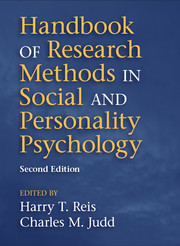Book contents
- Handbook of Research Methods in Social and Personality Psychology
- Handbook of Research Methods in Social and Personality Psychology
- Copyright page
- Contents
- Contributors
- Introduction to the Second Edition
- Introduction to the First Edition
- Chapter one Scratch an Itch with a Brick
- Part one Design and Inference Considerations
- Chapter two Research Design and Issues of Validity
- Chapter three Research Design
- Chapter four Causal Inference and Generalization in Field Settings
- Chapter five Field Research Methods
- Part two Procedural Possibilities
- Part three Data Analytic Strategies
- Author Index
- Subject Index
Chapter five - Field Research Methods
from Part one - Design and Inference Considerations
Published online by Cambridge University Press: 05 June 2014
- Handbook of Research Methods in Social and Personality Psychology
- Handbook of Research Methods in Social and Personality Psychology
- Copyright page
- Contents
- Contributors
- Introduction to the Second Edition
- Introduction to the First Edition
- Chapter one Scratch an Itch with a Brick
- Part one Design and Inference Considerations
- Chapter two Research Design and Issues of Validity
- Chapter three Research Design
- Chapter four Causal Inference and Generalization in Field Settings
- Chapter five Field Research Methods
- Part two Procedural Possibilities
- Part three Data Analytic Strategies
- Author Index
- Subject Index
Summary
- Type
- Chapter
- Information
- Publisher: Cambridge University PressPrint publication year: 2014
- 34
- Cited by

